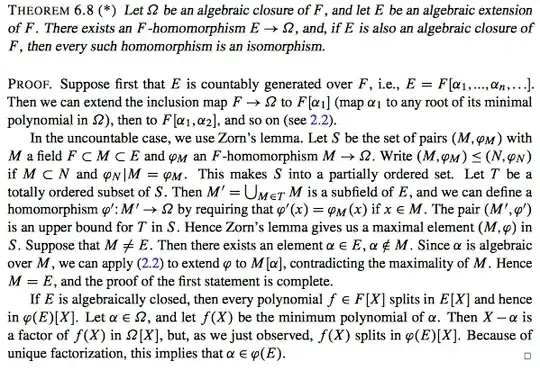Briefly: I want to prove that these two definitions for "normal extension" are equivalent: "$K$ is a splitting field for a collection of polynomials in $F[x]$" vs. "Every irreducible polynomial in $F[x]$ with a root in $K$ splits completely in $K$". But I don't have much machinery for working with splitting fields of multiple (much less infinite) polynomials. My proof involved a use of well-ordering and transfinite induction that I'm not that confident about. Is there an easier way to prove this?
Less briefly: In our abstract algebra class, we were asked to prove the following theorem:
Problem: Let $K$ be a finite extension of $F$. Prove that $K$ is a splitting field over $F$ if and only if every irreducible polynomial in $F[x]$ that has a root in $K$ splits completely in $K[x]$.
I tried to prove this without the restriction on finiteness, because clearly I don't have anything better to do with my time. The backward direction was unchanged, but my proof for the forward direction relied on the ability to "lift" isomorphisms to arbitrary splitting fields, i.e.,
Theorem: Let $\sigma : F \to F'$ be an isomorphism, and let $S \subseteq F[x]$ be a collection of polynomials. If $K$ is the splitting field of $S$ over $F$ and $K'$ is the splitting field of $\sigma(S)$ over $F'$, then there is an isomorphism $\tau : K \to K'$ such that $\tau$ restricted to $F$ is exactly $\sigma$.
We have already proven that we can do this for the splitting field of a single polynomial, but induction can only get me so far (finite collections). So I tried to use transfinite induction. Here's a rough sketch of my proof (I wrote it out in full on the problem set, so I can fill in any details if need be):
- By the Axiom of Choice, we can well-order $S = (p_i)_{i \in I}$ by some index set $I$.
- Let $F_0 = F$, and for each $i \in I$, let $F_i$ be the splitting field of $p_i$ over $\bigcup_{j < i} F_j$. Let $K = \bigcup_{i \in I} K_i$.
- [Proof that $K$ is a splitting field of $S$ over $F$]
- Do the same for $F'$.
- Let $\sigma_0 = \sigma$. For every successor ordinal $i + 1$, let $\sigma_{i + 1} : F_{i+1} \to F'_{i+1}$ be a lift of $\sigma_i$.
- For every limit ordinal $i$, we have to take an additional step. For all $j < i$, union together all $F_j$ to get $L_i$, and then we can define $\varphi : L_i \to L'_i$ as a 'union' of all the $\sigma_j$. Now, we let $\sigma_i$ be the lift of $\varphi$ to $F_i$ and $F'_i$.
- Lastly, we union together all the $\sigma_i$ to get a $\tau : K \to K'$, and show it is an isomorphism, and that when restricted to $F$, it is exactly $\sigma$.
Here's a diagram I included, but I'm not sure how much that helps.

This feels pretty cumbersome, but it also proves many results together (including the existence of algebraic closures!). Is there a cleaner way to prove the theorem? In particular, I'm much more comfortable with Zorn's Lemma than transfinite induction. (I suspect it requires Choice, in one form or another).
And if the theorem is still just has hard, is there an easier way to prove the actual problem? The only proofs I've seen seem to take for granted that we can lift isomorphisms to algebraic closures, which seems to be just as hard as what I'm trying to prove.


